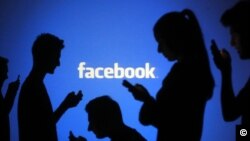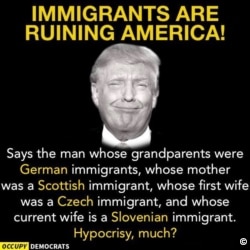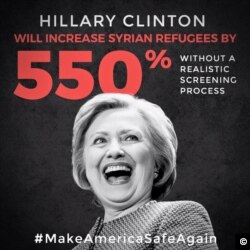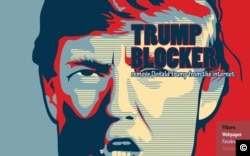A new battle is underway in the American presidential race between Republican Donald Trump and Democrat Hillary Clinton -- not on the campaign trail, but rather on Facebook. Some people are bombarding the social networking site with articles about the candidates, and adding their own opinions of them. "Hurtful", "harmful" and "go too far" are some of the words Facebook “friends” who receive these posts in their daily feeds are using to describe them.
Articles like “Trump says Clinton ‘knows she’s guilty’” or “Clinton labels Trump a ‘racist’” are sandwiched in-between motivational articles, recipes and vacation photos.
Mike Moran, a Facebook user from Illinois, told VOA he thinks current “newspaper stories and editorials are a lot more genteel” than the mud-slinging on Facebook.
The enormous website has an estimated 1.5 billion users worldwide. From January 1 to August 1, Facebook reports that 100 million people in the United States created 4 billion posts, comments, shares and reactions about the November 2016 presidential election.
Shanto Iyengar, a political science professor at Stanford University who studies news coverage, says Facebook is now a major source of news, debate and personal expression.
And that includes the “constant negative messages” by both Clinton and Trump, says Scott Talan, a communications professor at American University in Washington.
“The candidates are not conducting a civil campaign and people are mirroring that” on Facebook, he explains, by saying things like “If anyone votes for the candidate I don’t like then they can’t be my friend.”
Wanna be my friend? Not if you're too partisan!
Facebook user Ed Hamell, from New York, expresses his political views by posting articles to his feed. He admits he's unfriended a couple of people.
“I love a good discussion on political and social issues and am curious about how people think and what they value,” he explains. “But I have little tolerance, though, for nastiness, cruelty and disrespect.”
In Ohio, Cindy Gabriel has thought about unfriending some people “because of their mean and ugly comments.”
“You can still present your politics,” Talan says, “but you can do it in a civil way and people can agree to disagree.”
Pam Burdick of Maryland thinks the exchange of ideas is good, while Lorene Bachman in Hawaii doesn’t care what’s being posted on Facebook because “it can be ignored.”
Overseas, New Zealander Jacquie Phipps is closely watching the U.S. presidential campaign. “I find most of the Trump rhetoric at best worrying and at worst deeply offensive,” she says. “But so far, no one in my Facebook world has expressed views different from mine in this regard.”
That doesn’t surprise Talan, who says people who are “friends” with each other usually “want to hear the views they agree with.”
For Facebook users wanting to avoid the political debate, there's the site’s “mute” feature. It can help block unwanted messages by disabling notifications from a particular person or page. Apps like the “Trump Blocker” and “Hillary Blocker,” keep content from those candidates off your Facebook page. And the “Kardashian Filter,” will block any words that annoy you.
Moran doesn’t think it’s a good idea to “unfriend” anybody over political disagreements. His advice? “Just remember it will all be over on November 8, Election Day."







